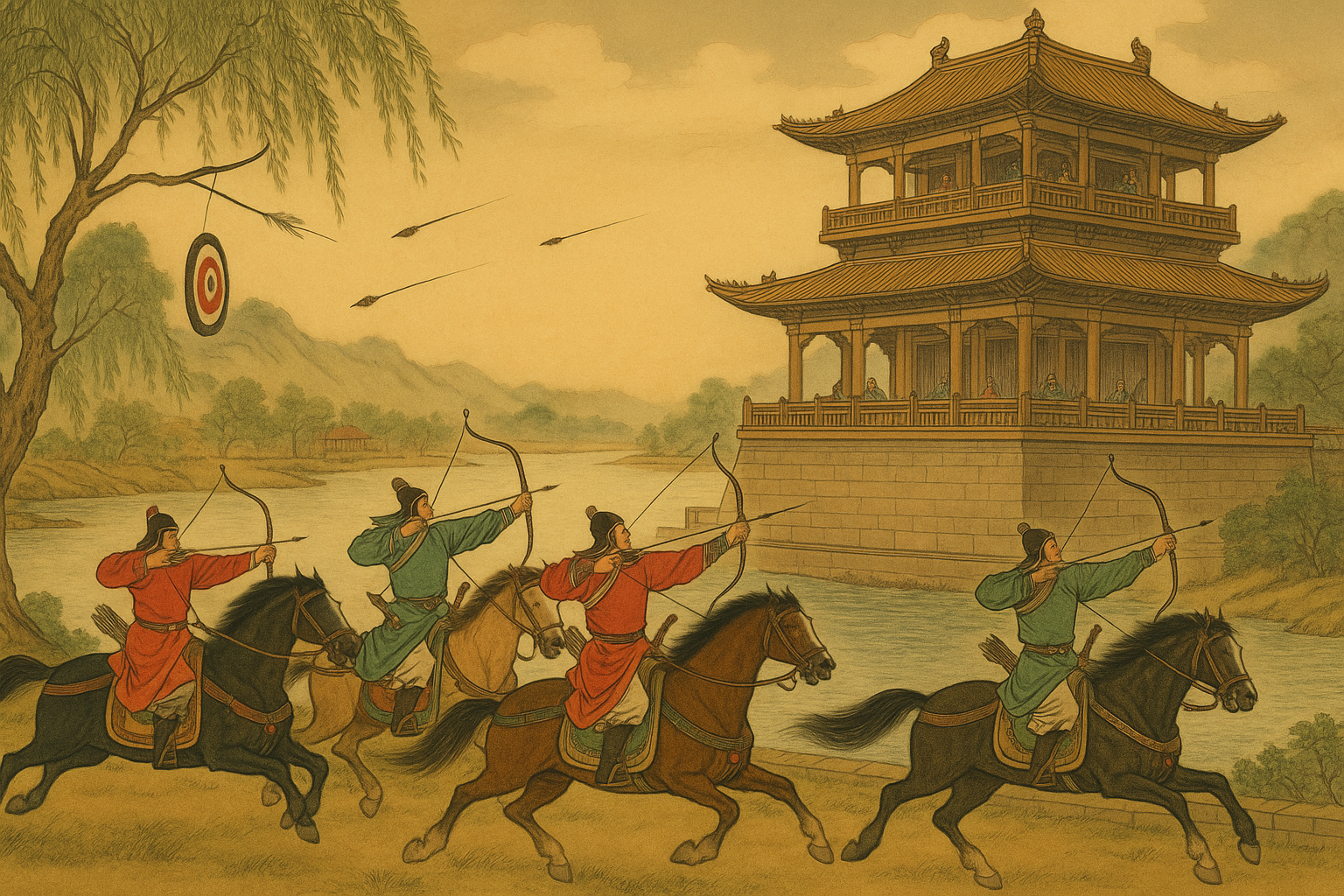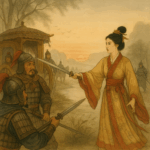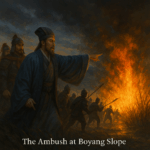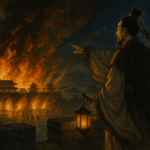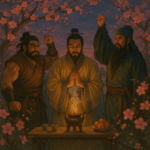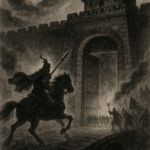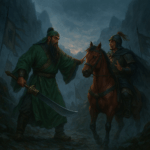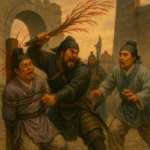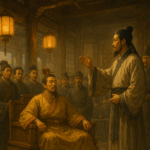After being ambushed by Zhuge Liang’s prearranged forces—Guan Yu, Huang Zhong, and Wei Yan—Zhou Yu suffered a crushing defeat. Huang Gai and Han Dang rushed aboard their flagship to rescue him, routing countless Wu naval troops in the process. From a distance, they saw Liu Bei and Lady Sun’s carriage halted atop a hill. How could Zhou Yu refrain from fury? His arrow wounds, not yet healed, split open from the exertion; he collapsed unconscious. His officers revived him, but at Zhuge Liang’s command they ceased the pursuit and returned with Liu Bei to Jingzhou to celebrate their victory and reward the troops.
When Zhou Yu reached Chaisang, Jiang Qin and the others rode back to Nanxu to report the news to Sun Quan. Sun Quan, boiling with rage, planned to appoint Cheng Pu as commander to raise forces and seize Jingzhou at once. Zhou Yu submitted a memorial urging immediate action. Zhang Zhao counseled restraint: “Cao Cao broods day and night over avenging Red Cliffs. He fears a united Sun–Liu front and therefore has held back. If Your Majesty now turns on Liu Bei in anger, Cao will seize the opening to strike, endangering our realm.” Gu Yong added, “Cao surely has spies here; if they learn of discord between Sun and Liu, he will court Liu Bei. Afraid of Eastern Wu, Liu Bei may defect to Cao. Then when will our southeast be safe? Better to send an envoy to Xu capital to recommend Liu Bei as Governor of Jingzhou. Cao will hear this and hesitate to attack us. Liu Bei will harbor no resentment toward Your Majesty. Then with secret agents sowing discord between Cao and Liu, we can strike both in turn.” Sun Quan agreed and asked whom to send. Gu Yong replied, “There is Hua Xin—whom Cao Cao greatly admires.” Sun Quan dispatched Hua Xin bearing the petition to Xu.
Hua Xin arrived in Ye to find Cao Cao hosting ministers in celebration of the newly completed Copper Sparrow Terrace. Cao Cao, still nursing his Red Cliffs defeat and eager for revenge but fearful of Sun–Liu unity, had summoned civil and military officials to his riverside pavilion. At its center rose the Copper Sparrow Terrace; to the left stood the Jade Dragon Terrace and to the right the Golden Phoenix Terrace, each ten zhang high, linked by two overhead bridges, their halls gleaming with gold and lacquer. Cao Cao himself wore a jewel-encrusted golden crown, a green brocade robe, jade belt, and pearl-inlaid boots as he sat in state on the platform, his officers arrayed below.
He ordered a mounted archery contest. A crimson Sichuan brocade battle robe was hung on a willow branch; a target was set a hundred steps away. Officers were divided into two teams—the Cao clan in red robes, the others in green—each armed with composite bows and long arrows, mounted and ready. Cao Cao proclaimed, “Whoever strikes the red center shall claim this brocade robe; if you miss, you must drink a cup of water in penalty.”
At the signal, Cao Xiu of the red team cantered forward, drew to full length, and his arrow struck dead center. Drums and gongs thundered as the crowd cheered. Cao Cao exclaimed, “This is my swift steed!” As he prepared to award the robe, Wen Ping of the green team rode out, declared that the robe should go first to an outsider, and his arrow too struck the center. Cheers erupted again. Cao Hong then rode out from the red team, loosed an arrow into the center. Zhang He of the green team vaulted in the saddle and launched a backhand shot that also hit true. Xiahou Yuan of the red team leapt to the line and his arrow nestled perfectly in the center. Xu Huang of the green team split the willow branch with his arrow, sending the robe fluttering down—and he claimed it. Yet Xu Chu then rode out from the green team to attempt to take it, and a brief scuffle ensued until Cao Cao intervened, awarding each of the six officers a bolt of fine Shu brocade. They resumed their seats as music played and libations flowed.
Cao Cao then invited the civil ministers to compose commemorative poems. Wang Lang, Zhong Yao, Wang Can, and Chen Lin each offered odes praising his virtues. He laughed, saying he had once been a simple scholar who built a study in the countryside to read and hunt, but “the court summoned me to rid the realm of rebels. I only sought to merit the epitaph ‘Tomb of the Late General Who Pacified the West.’ Having fought from Dong Zhuo to Liu Biao, I have humbled all foes. As Chancellor, what more could I wish? If not for these arms, who else would stand here? Some suspect me of plotting for the throne—utter folly! I cannot give up real power for an empty reputation, lest the realm fall to worse fates.” The assembly bowed: “No one since Yi Yin or the Duke of Zhou has matched the Chancellor’s virtue.” A later poet penned:
Duke Zhou feared rumor’s whispering gale,
Wang Mang in humble courtesy did prevail.
Had he perished ere the storm had passed,
Who now would know his fame to last?
Cao Cao, emboldened by wine, took pen and ink to write his own “Copper Sparrow Terrace Poem,” but a messenger announced, “Sun Quan has sent Hua Xin’s petition recommending Liu Bei as Governor of Jingzhou—and mentions his sister’s marriage. Most of the nine commanderies now belong to Liu Bei.” Cao Cao dropped his brush in alarm. Cheng Yu asked, “Why such distress, sir, when you have stood unmoved amidst ten thousand enemies?” Cao Cao replied, “Liu Bei is a dragon among men, never before bound by water. Now, given Jingzhou, he is a dragon loosed into the sea—how can I remain unmoved?” Cheng Yu explained Sun Quan’s tactic: “He would court Liu Bei to reassure you and hold you back.” Cao Cao nodded: “Indeed.” Cheng Yu continued, “I have a plan: recommend Zhou Yu as Governor of Nan Commandery, Cheng Pu as Governor of Jiangxia, keep Hua Xin at court—Zhou Yu will consider Liu Bei a foe, and conflict will arise for us to exploit.” Cao Cao exclaimed, “That is precisely my thought!” He summoned Hua Xin, showered him with honors, and returned to Xu, appointing Zhou Yu, Cheng Pu, and ennobling Hua Xin.
When Hua Xin arrived in Eastern Wu, Zhou Yu and Cheng Pu accepted their posts. Zhou Yu, thirsting for vengeance, petitioned Sun Quan to order Lu Su to demand Jingzhou’s return. Sun Quan summoned Lu Su: “You pledged Jingzhou to Liu Bei; he delays and does not return it—what shall we do?” Lu Su replied, “He promised to return it once Yi Province was secured.” Sun Quan snapped: “He pledged to take Yi Province and yet acts no more to do so!” Lu Su offered to sail to Jingzhou to plead the case.
Meanwhile in Jingzhou, Liu Bei and Zhuge Liang stocked provisions and drilled troops, attracting many troops to their banner. They learned of Lu Su’s arrival. Liu Bei asked Zhuge Liang for advice. Zhuge Liang said: “If Lu Su demands Jingzhou, you must feign overwhelming grief—then I will emerge to counsel him.” They invited Lu Su to the hall. Lu Su said: “Sun Quan’s orders are clear—return Jingzhou now that our houses are joined in marriage.” Liu Bei covered his face and wept bitterly. Lu Su asked: “Why such sorrow?” Liu Bei’s tears would not cease. From behind a screen, Zhuge Liang emerged: “Lu Su, do you know why? When my lord borrowed Jingzhou, he vowed to return it after Yi Province was taken. Yet Yi Province is held by his brother Liu Zhang—attacking him invites accusations of betraying kinsmen. If he does not attack or return Jingzhou, where shall he stand? He is caught between impossible choices, hence these tears.” Struck by this, Liu Bei tore at his robe and wailed.
Moved, Lu Su agreed to speak with Sun Quan again. After a banquet, he returned to Chaisang and reported to Zhou Yu, who exclaimed: “Lu Su has again fallen into Zhuge Liang’s trap! But I have a counter: tell him not to see Sun Quan but to go to Jingzhou and say, ‘Since Sun and Liu are now kin, Wu will march on Yi Province if Liu does not. When Yi falls, let it serve as marriage portion, then return Jingzhou to Wu.’” Lu Su rejoiced and rode back.
Liu Bei and Zhuge Liang plotted: “Lu Su has never seen Sun Quan but only Zhou Yu, who seeks to lure us again. We shall nod to anything he says.” Lu Su arrived and reported: “Sun Quan admires your virtue and offers to send forces to seize Yi Province, exchanging it for Jingzhou, provided he is supplied.” Zhuge Liang quickly nodded: “How magnanimous of Sun Quan!” Liu Bei thanked him warmly. Zhuge Liang instructed: “When the army arrives, you must ride out to welcome them.” Lu Su departed in high spirits.
Liu Bei asked Zhuge Liang, “What does this truly mean?” Zhuge Liang laughed: “Zhou Yu’s days are numbered! He cannot outthink me.” Liu Bei asked how. Zhuge Liang explained: “It is the stratagem of ‘borrowing a route to destroy Guo.’ They feign taking Yi Province only to seize Jingzhou. When you ride out with supplies, we will seize the city by surprise. Then Zhou Yu’s life will be nearly spent.” He then called Zhao Yun to outline the details. Liu Bei rejoiced. A later poem praised:
Zhou Yu plotted to seize Jingzhou by might;
First Zhuge foresaw the plan with insight.
With fragrant bait upon the river cast,
The fisher’s hook ensnares its prey at last.
Lu Su reported to Zhou Yu that Liu Bei and Zhuge Liang were overjoyed and would soon ride out. Zhou Yu laughed: “They have again fallen into my trap!” He sent Cheng Pu with troops to rendezvous, then personally led fifty thousand men by land and water toward Jingzhou, confident Zhuge Liang was deceived.
At Xiakou, Zhou Yu asked if Jingzhou sent out a welcome. A scout answered: “Liu Bei’s envoy Mi Zhu waits.” Zhou Yu summoned Mi Zhu: “Has your lord prepared his troops?” Mi Zhu replied: “All is ready.” “Where is Liu Bei?” Zhou Yu asked. “He waits outside the city gate,” came the reply. Zhou Yu said: “Such courtesy must be honored,” and Mi Zhu departed.
As their fleet approached Jingzhou, no vessels came forth. Alarmed, Zhou Yu beached his ships and led Gan Ning, Xu Sheng, Ding Feng, and a thousand cavalry ashore. They rode to the city walls and shouted for admission. A voice called down: “Who stands there?” “Zhou Gongjin of Eastern Wu in person!” they answered. At once, the city garrison leveled spears and swords. Zhao Yun appeared atop the wall: “Why have you come?” Zhou Yu said: “I come to help Liu Bei seize Yi Province—surely you know?” Zhao Yun answered: “Zhuge Liang foresaw your ‘borrowed route’ plot and left me here. My lord has declared: ‘Liu Zhang and I share Han blood—we cannot betray family for conquest.’ If Wu truly aims at Shu, I would rather break my oath in the mountains.” Hearing this, Zhou Yu turned his horse and fled. Then a runner arrived bearing dire news: four armies—Guan Yu from Jiangling, Zhang Fei from his return march, Huang Zhong from Gong’an, and Wei Yan over the mountain path—were converging, their war cries echoing for a hundred li. Zhou Yu cried out; his arrow wound burst open again and he collapsed. As a poet later wrote:
A single misstep scatters the grandest scheme;
All calculations vanish like a dream.
What fate befell Zhou Yu? We shall see in the next installment.
